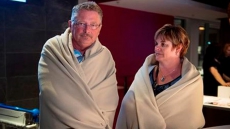VANCOUVER — As Vancouver Police jail guards allegedly bound her feet with a strap and yanked it hard under a cell door, Bobbi O'Shea remembers feeling betrayed.
"These are the people who are supposed to protect us, and they're hurting me," she says, her eyes filling with tears. "What gives them the right to do this to me?"
O'Shea will finally have her day in court on Tuesday, when her lawsuit against the City of Vancouver and four Vancouver Police officers is set be heard.
She says in 2008 she suffered a panic attack after smoking crack cocaine and called for help.
Police took her to jail, where officers placed her in a so-called passive restraint system.
The system involved sitting her on the floor with her legs outstretched. Her hands were cuffed behind her back and her feet were tied together with a strap, which was pulled under a door and tethered to something in the hallway, her claim alleges.
The 44-year-old First Nations woman says she felt a hard tugging on the strap for the entire hour she was restrained.
"It felt like torture. I thought my feet were going to come off my legs," she says. "I was screaming at the top of my lungs."
The mother of four is seeking $25,000 in damages for alleged lasting injuries and emotional trauma. Her lawyer, Doug King of Pivot Legal Society, says police should have taken her to a sobering centre instead of jail, and their use of the restraint amounted to assault.
None of the allegations has been tested in court. The city and police declined to comment ahead of the hearing.
In court documents, the city denies her allegations and calls for the claim to be dismissed. It says if guards used any force it was legal and reasonable because O'Shea disobeyed commands.
"(The constables) were acting in good faith," the documents state. "None of their actions that day can be characterized as being grossly negligent, dishonest, malicious or wilful misconduct."
O'Shea says she was initially placed in a cell with a window so a male guard could see her using the toilet. She covered the window with toilet paper and refused to remove it unless a female guard watched over her, she says.
The male guard then took her to another cell where he cuffed her hands behind her back, she says. Guards put her in the restraints after she says she moved her hands to her front to wipe her badly running nose.
After her release, O'Shea says she began using crack cocaine heavily and became homeless for about a year. She now lives in Burnaby, B.C. and sees a psychiatrist, but feels frequent numbness in her legs and post-traumatic stress, she says.
"It's really put my life on hold," she says, adding her trust in police is broken. "I feel like I fear for my life .... There needs to be more sensitivity training when it comes to aboriginals and not to be so abusive to them, because they've already been very abused."
King says the suit was filed in 2010 but took years to get to court because the society struggled to obtain the identities of the accused guards.
One of the questions he hopes will be answered at trial is whether the restraint system is still standard practice in Vancouver. In May 2008, a teenager won $60,000 from Victoria police after she was similarly tethered to a door.
King added Vancouver needs a standalone sobering centre, one of the recommendations from the 2009 inquiry into the death of Frank Paul, a severely intoxicated aboriginal man who died of hypothermia after police left him in an alley.
While there is a sobering centre attached to a Vancouver detox centre, King says there are only six beds and he still hears complaints of intoxicated people being taken to jail.




